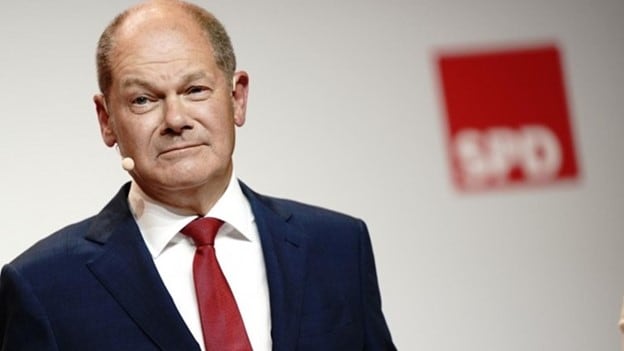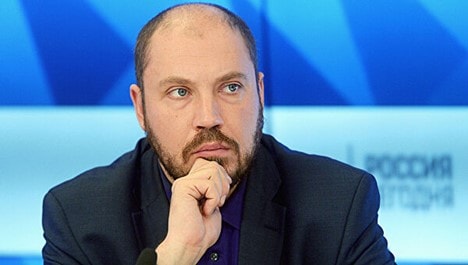The Angela Merkel era ends with the Bundestag's December 8, 2021 vote in favor of Chancellor Olaf Scholz' new government, a coalition headed by Scholz' Social Democratic Party (SPD), the Greens and the Free Democratic Party (FDP). Russian papers generally preferred to cite foreign papers on the transition, but Russian assessments generally tended towards cautious optimism that even given the current tensions in Europe over Ukraine, relations between Berlin and Moscow would not worsen appreciably even if they would not markedly improve. The hope for continued pragmatic relations was based on the expectation that the SPD would be able to neutralize its junior coalition partners whose attitude towards Russia was more sharply critical. Kommersant's Dmitry Drize believed that the end of the Merkel era signaled the passing of an era that espoused compromises that were no longer working. There would be continuity, but not because the new German government shared Merkel's approach. Germany that no longer spoke for Europe, would be waiting to see how the dust settled.
A survey of Russian reaction to the change in power in Berlin follows below:

Olaf Scholz (Source:Eadaily.com)
Kosachev: More Of The Same
The Vice-Speaker of the Federation Council, Senator Konstantin Kosachev, was cautious about the future of Russian-German relations. He believed that significant changes in the FRG's policy towards Russia were unexpected.
“In general, it won't get much worse nor will it get much better– inertia–" predicted Kosachev.
Kosachev was concerned about the "the emergence of a Green politician at the helm of the German Foreign Ministry" in the person of, Annalena Berbock. Berbock he warned would play a negative role given her unequivocal anti-Russian statements.
"We recall that, Annalena Berbock regularly comes out with tough anti-Russian statements. In particular, in October she stated that the Russian Federation was allegedly responsible for the shortage of gas in Europe, and that Nord Stream 2, in her opinion, was contrary to European interests."[1]
Russian Germany Watchers Continuity With Some Upside
According to Alexander Kamkin, a researcher at the Center for German Studies at the Russian Academy of Sciences' Institute of Europe, is cautiously optimistic given the pragmatic approach that characterizes the SPD. He emphasizes the party's secretary Lars Klingbeil, as an influential person who is well-disposed to Russia. Kamkin mentioned the relationship of the two SPD leaders to former SPD Chancellor Gerhard Schroder. Schroder, as may be recalled, went from chancellor to the highly lucrative post of head of the shareholder's committee of the Nord Stream pipeline between Russia and Germany. He now sits on the board of Russian energy conglomerate Rosneft. While these financial ties to Russia have more than raised eyebrows in Germany, for Kamkin the relationship with Schroder offered grounds for optimism.
SUPPORT OUR WORK


Lars Klingbeil (Source: Dw.com)
“Many members of the SPD favor a constructive dialogue with the Russian Federation. The same Scholz, when he was [party] chairman, worked together with Schroder, as did Klingbeil, who realizes all the benefits of increasing the dialogue between Moscow and Berlin. Scholz is also generally pragmatic about relations with the Russian Federation, given the text of the coalition agreement, that contains a positive signal towards Moscow.
Like Kosachev, Kamkin was aware that the three coalition members were not of the same mind on Russia.“After all, Klingbeil’s constructive position on relations with the Russian Federation collides with the vision of the same Annalena Berbock, who adheres to harsh anti-Russian rhetoric. And in general, the majority of the Greens, Like Free Democrats, look at relations with Russia, to put it mildly, not as optimistically as the SPD representatives." Here Scholz' political skill in keeping "such a motley ruling cabinet within the framework of a common general line," would be tested.

Aleksander Kamkin (Source: Uz.sputniknews.ru)
Vladimir Olenchenko, a senior researcher at the Center for European Studies, IMEMO RAS, agrees with Kamkin that control over the coalition is the key and only time will tell to what extent Scholz, Klingbeil and other SPD representatives in the German government will be able to develop Russian-German relations "in a positive direction"[2]
Alexander Vatlin, a professor at the Department of Modern and Contemporary History of Moscow State University is hopeful that the new government will lean on Ukraine.
"The question is not whether or not there will be an attempt to revive Minsk, but how much Berlin's position in relation to Kiev will change. There may be an increase in pressure (with the involvement of financial levers), prompting Ukraine to take peace initiatives."
Maria Butina, a member of the Committee International Affairs, who was briefly jailed in the US for acting as an unregistered foreign agent, believes that Germany's role in the Minsk agreements is overestimated. The main issue is Ukrainian violations
“They purchased and used new weapons, including Turkish drones. You need to pay attention to this. It has nothing to do with the personality of the future chancellor."[3]
Kommersant columnist Dmitry Drize believed that Germany would act cautiously towards Russia both due to Russia's energy and military assets, but because the Merkel era of inelegant compromises was over and it would wait and see how things turned out. Drize wrote:
"Recently, and most regrettably, we too often had to use the expression "the era is over". Rather, I staunchly and with all my might sought to get away from this cliché, but in the case of Angela Merkel, this is the most accurate definition. The era of political compromises is a thing of the past. The world is becoming tougher. This can no longer be denied, and it does not bear anything good. Actually, Merkel left, not really because such schemes do not work at all - they simply do not produce the needed result.
"If we talk in the case of Russia, then the Minsk Agreements are a vivid example of this - the brainchild of, one might already say, the former Federal Chancellor. Yes, they played an important role, stopped the war (or rather, its hot phase), but since then there has been no movement. There are only calls to observe them, which in reality has not happened for a long time.
"Another major compromise project, Nord Stream 2, has been built but is not working. Ukraine is an ally, a friend, and Russia is punished with sanctions for destabilizing it.
"Germany, on the one hand, is the organizer and the ideological force behind these measures, and on the other hand, it deprives Kiev of income from gas transit. That is, it puts his friend, shall we say, in an extremely difficult situation, which threatens economic collapse.
"And here's the latest: Merkel calls the President of Belarus Alexander Lukashenko, trying to solve the problem of migrants, as a result, official Berlin is under fire and is forced to make excuses for making concessions to the dictator. Although, by and large, it was still possible to partially remove the urgency, without solving the problem in principle. And a major question remains, what carries greater weight- Merkel's flexibility or the decisiveness of Poland and the Baltic states, and behind them the entire EU. To be honest, it is not entirely clear how the new government will resolve all these issues. Moreover, there is a global demand for toughness, for a strong hand. And the attitude towards Russia, also unfortunately, is changing and not for the better.
"The only thing that the new chancellor Olaf Scholz could say was that there would no longer be any special relationship with Moscow. However, the Kremlin still has its own serious trump cards, which cannot be ignored. This is, first of all, energy, very profitable prospects for cooperation and, of course, the army and the navy. All these factors combined makes the new German cabinet even more vulnerable to its Eastern partner. Moreover, there is also serious pressure from a Western partner, that is, America.
"There is a widespread belief that Germany will eventually lose its leadership in the European Union, which it chaired behind the scene.
"And since there is no worthy successor, this will mean a further crisis in the community. And this is not entirely bad, because the Union needs reforms: in its current form, it is clearly not keeping up with reality. That is what makes tectonic shifts. So, it is logical to expect from Scholz a smooth continuation of Merkel's policy without any drastic steps. Now is the time to hunker down as far as the concerned German voter will allow".





